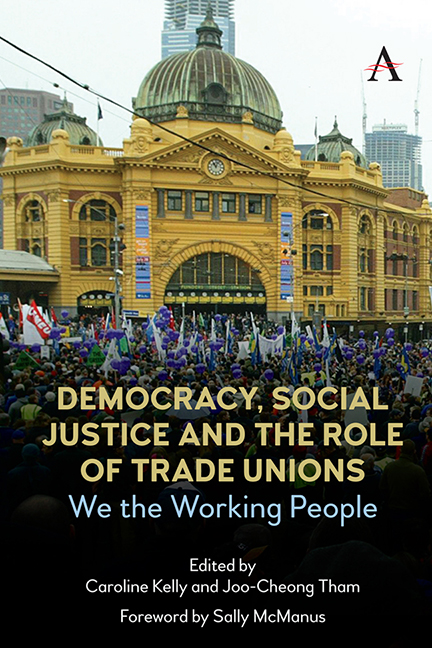Book contents
- Frontmatter
- Contents
- Foreword
- Acknowledgements
- Chapter 1 Democracy and Social Justice as Organising Principles
- Chapter 2 Economic Democracy, Workers and Unions
- Chapter 3 Nobody Owns the Future
- Chapter 4 Regulatory Approaches to the Internal Affairs of Trade Unions in Australia: From Democratic Control to Corporate Accountability
- Chapter 5 Trade Unions and the Regulation of Election Funding: Between Libertarianism and Egalitarianism
- Chapter 6 Trade Unions and Precarious Work: In Search of Effective Strategies
- Chapter 7 ‘Is There an App for That?’ Worker Representation, Unions and the Gig Economy
- Chapter 8 Temporary Migrant Workers and Trade Unions in Australia: A Complex Relationship
- Chapter 9 Unions, Fossil Fuel Exports and a Just Transition
- Chapter 10 Trade Agreements, Labour Rights and Democracy
- Chapter 11 Trade Unions, Labour Law and Democratic Socialism: The COVID-19 Crisis in the United Kingdom
- Notes on Contributors
- Index
Chapter 9 - Unions, Fossil Fuel Exports and a Just Transition
Published online by Cambridge University Press: 18 November 2021
- Frontmatter
- Contents
- Foreword
- Acknowledgements
- Chapter 1 Democracy and Social Justice as Organising Principles
- Chapter 2 Economic Democracy, Workers and Unions
- Chapter 3 Nobody Owns the Future
- Chapter 4 Regulatory Approaches to the Internal Affairs of Trade Unions in Australia: From Democratic Control to Corporate Accountability
- Chapter 5 Trade Unions and the Regulation of Election Funding: Between Libertarianism and Egalitarianism
- Chapter 6 Trade Unions and Precarious Work: In Search of Effective Strategies
- Chapter 7 ‘Is There an App for That?’ Worker Representation, Unions and the Gig Economy
- Chapter 8 Temporary Migrant Workers and Trade Unions in Australia: A Complex Relationship
- Chapter 9 Unions, Fossil Fuel Exports and a Just Transition
- Chapter 10 Trade Agreements, Labour Rights and Democracy
- Chapter 11 Trade Unions, Labour Law and Democratic Socialism: The COVID-19 Crisis in the United Kingdom
- Notes on Contributors
- Index
Summary
A climate transition needs to make deep cuts to our emissions in a very short amount of time. Though the timeframe to achieve cuts sufficient to avoid harmful impacts is contracting rapidly, a transition must nevertheless aim to ensure that whatever policies are adopted achieve a just outcome, especially for the disadvantaged. Tax increases, lifestyle restrictions or the closing of whole fossil fuel industries must be managed in a way that does not place unfair burdens on those who are least able to bear them. The need to combine mitigation with justice is captured in just transition discussions that typically position a climate transition as part of a broader social renewal, such as the Green New Deal.
The role of the union movement in this process will be vital. Unions can play a key role in arguing for and achieving a just transition given their representative position for the many workers who stand to be affected by a climate transition and in virtue of their substantial public advocacy capacity. Moreover, as Joo-Cheong Tham and Caroline Kelly argue in Chapter 1 to this volume, social justice is central to trade unions. This is reflected in their direct advocacy on behalf of their members and in their ability to achieve broader social change. Yet, the role of unions will not always be straightforward. While their potential for increasing the likelihood of a just transition is great, their choices will involve short-term disadvantage for some union members and significant readjustments for some unions as a whole, especially mining unions. Bringing about a just transition will involve job losses for workers employed in the fossil fuel industry – a small but significant subset of union members in countries such as Australia. Identifying what positive role the union movement can play as well as identifying potential ‘flashpoints’ deserves attention. This will be particularly true in Australia where the fossil fuel industry exerts such a huge influence on responses to climate change.
There will be many kinds of issues facing the union movement as a whole in relation to climate change, from protecting workers in industries that are acutely affected by climate change (aged care workers, firefighters and so on) to articulating the larger framework that a just transition needs to follow.
- Type
- Chapter
- Information
- Democracy, Social Justice and the Role of Trade UnionsWe the Working People, pp. 155 - 170Publisher: Anthem PressPrint publication year: 2021



